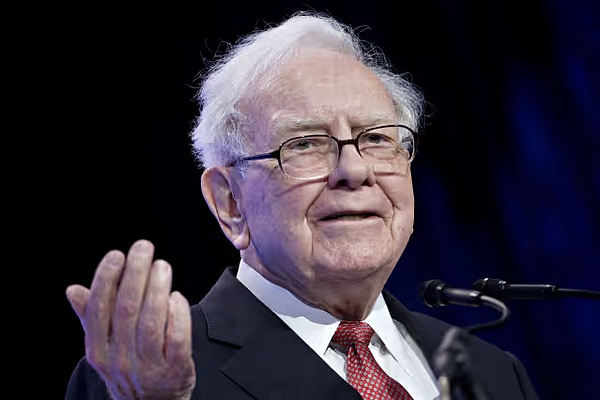Source: Barron's Chinese
The sell-off in U.S. stocks this year proves the foresight of Berkshire's net selling of stocks last year. Buffett, known as the "Omaha Oracle", is still as sharp as ever.
Now it's Buffett's turn to say "I told you so".
When the S&P 500 hit more than 50 closing highs at the end of last year, Berkshire Hathaway (BRK.B) CEO Buffett was busy selling stocks, and his operation left many market observers scratching their heads.
Now the answer seems to be there.
The decline of the U.S. stock market in 2025 proves the foresight of Berkshire's stock purchase operation in the fourth quarter of last year.
According to Berkshire's recently filed 13-F filing, Buffett went against the market's bullish sentiment at the end of last year and sold about $5 billion of Bank of America (BAC) and $3 billion of Citigroup (C) in the fourth quarter, while significantly reducing holdings of Brazilian fintech company NU Holdings (NU), cable TV operator Charter Communications (CHTR) and Sirius XM (SIRI).
Buffett did not continue to sell major holdings such as Apple (AAPL) in the fourth quarter, while a new position in spirits maker Constellation Brands (STZ) became the only large-scale purchase in the quarter. Overall, Berkshire was a net seller of stocks in 2024, and the company currently has more cash on hand than any other US company.

After Berkshire disclosed its 13-F filing in mid-February, Andrew Barry, a long-time contributor to Barron's who has been following Buffett's investment moves, wrote in an article that "Buffett has gone against the market in the past, including during the dot-com bubble in the late 1990s. His decisions have proven to be correct, and they may be correct this time as well."
Soon after the article was published, this happened: Since Berkshire disclosed its 13-F filing on February 14, the S&P 500 has fallen by about 5%. In fact, the S&P 500 has given up all of its gains in the fourth quarter of last year after the U.S. presidential election.
In retrospect, it should be easy to understand why Buffett sold stocks as the stock market hit new highs. While some fund managers (such as Bill Ackman) have criticized Buffett for being too conservative in allocating funds in recent years, there were plenty of signs in the fourth quarter that the stock market could be turbulent. President Donald Trump has made no secret of his plans to set tariffs as he pleases in his second term, and many market watchers say Trump “didn’t mean it,” but it turns out he did.
The 2018 stock market selloff on Trump’s tariffs is playing out again.
Buffett may have had his eye on trade tensions in the fourth quarter, recently saying tariffs are an “act of war” that will make America’s inflation problem worse. Even without tariffs, the stock market doesn’t like uncertainty, and the sudden rollout of policies and headlines that were a hallmark of the first Trump administration are playing out again.
However, Buffett’s investment decisions may reflect much more than politics.
As fall arrived, U.S. inflation was still above the Federal Reserve’s 2% target, suggesting that the stock market had already reduced expectations for the Fed’s rate cut late last year. Inflation poses a headwind for consumer spending, a key driver of the U.S. economy, and any sign that the Fed is turning hawkish is cause for concern. The market's dismal performance in the third quarter of last year shows how quickly markets can fall when investor sentiment changes.
But for Buffett, the biggest reason for selling may be valuation. As stocks continued to hit new highs throughout the fourth quarter, stocks became increasingly expensive, not only relative to their own historical levels, but also relative to stocks in other countries and regions. U.S. stocks are "priced for perfection," which is not a phenomenon that value investors like Buffett like to see.
Similarly, corporate insiders did the same as Buffett, taking profits during the fourth quarter's stock market rally by selling quickly.
This does not mean that investors should stay away from U.S. stocks. If history is a guide, the policies of this Trump administration can change rapidly, and Trump has kept a close eye on stock market performance in the past. Many strategists still believe that the S&P 500 has the potential to rebound to well above 6,000 points by the end of this year, no matter how long it takes to get back up.
Buffett himself has not given up on stocks. In this year's letter to shareholders, he wrote, "Although some commentators have mentioned that Berkshire has accumulated a lot of cash, most of Berkshire shareholders' funds are invested in stocks, and our preference for stocks will not change."
The current sell-off in the US stock market shows that Buffett, known as the "Prophet of Omaha", is still in his prime. Some people say that Buffett's investment decisions are too conservative, but in fact, Buffett, who has a huge fortune, can be as cautious as he wants.
 Anais
Anais







